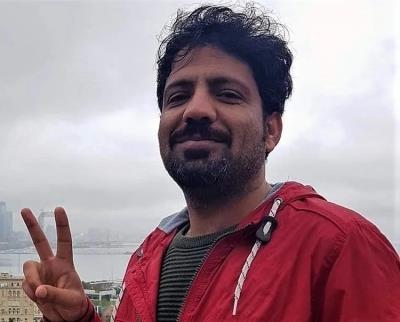Is A Watery Grave For Three Baloch Activists A Coincidence Or Murder?
New Delhi, Aug 8: The body of Saqib Karim was found on the seashore in Azerbaijan capital Baku on July 8. Saqib had escaped Pakistan after two of his brothers were killed in custody by the Pakistani Army.
Saqib had registered himself with the UN refugee agency (UNHCR) in Azerbaijan in an effort to seek asylum after having escaped from Pakistan to the Gulf, and then to Azerbaijan. Baloch activists say the authorities in Baku have closed the case after labelling it as an accident.
This was the third death by drowning of a Baloch asylum seeker on foreign shores, raising suspicion whether the ISI-the dreaded Pakistani spy agency, played a role in the deaths. Investigations by European countries have warned Pakistani dissidents living in asylum that they are not completely safe from the long arm of the Pakistani intelligence agencies.
In the first instance, Journalist Sajid Hussain Baloch went missing on 2 March 2020 in Sweden. Eventually the police found his body in the Fyris River on 23 April 2020. He had fled Pakistan years earlier after receiving threats over his reportage on the insurgency in Balochistan, where he wrote about enforced disappearances, drug trafficking and similar uncomfortable truths about the country.
It was a similar story for the Canada-based activist Karima Baloch who went missing on 2 December 2020 and her body was eventually found in a lake in Toronto. A Baloch activist, she had joined the movement for independence from Pakistan as a student and was regarded as an intellectual among the community. Amnesty International South Asia also called for an effective investigation into her death.
After their mysterious deaths, news website Balochwarna wrote a detailed feature highlighting how the Baloch community is witness to suppression and gruesome killings by Pakistan not only within the country but also outside it. The website also narrated a much-earlier story of Arif Barakzai, a member of the Baloch Students Organization (BSO), who died after falling from the 11th floor of a student hostel in the Norwegian capital Oslo on 10, January 2008. That death too was declared as an accident.
Investigations by local authorities in Sweden and Canada found no foul play in the deaths of Sajid Hussain and of Karima respectively. Last month the story repeated itself with Saqib in Azerbaijan.
However, there are too many similarities in the deaths of three Pakistani dissidents meeting their deaths in watery graves in three different geographies.
Even though Azerbaijan closed Saqib's case, Baloch organisation, the Baloch National Movement (BNM) urged the government to investigate Saqib's death, saying that he could have been murdered. BNM said that two of his brothers were killed in custody by the Pakistani army prompting Saqib to flee the country.
The important issue that the organisation raised is that Baloch activists, writers and journalists are not safe anywhere in the world. BNM spokesperson Qazi Rehman said: 'It was a matter of great concern that after being insecure in Balochistan, when Baloch took refuge in foreign countries, they were facing a similar situation there'. He added that it was too big a coincidence that Baloch refugees are drowning in a continuous process.
Tihs was a question that was raised in 2020 by Reporters Without Borders (RSF) after Journalist Sajid's body was found in Sweden. The RSF highlighted that suspicion lingers because Ahmad Waqass Goraya, a Pakistani blogger living in the Netherlands, too was attacked outside his home in Rotterdam. The RSF said that the attack on Goraya 'fits the modus operandi of Pakistani spy agencies'.
Pakistani intelligence agencies are notorious for carrying out attacks against people--intellectuals, journalists, activists and bloggers--who they think are inimical to Pakistani interests.
The BNM says that Saqib's two brothers, Shaheed Tariq Karim and Shaheed Asim Karim, were found dead with their bodies mutilated. The BNM says that besides the two brothers, 'other members of his family were also targeted'. Despite the fact that the police in all three countries have shut down the cases, the BNM has urged the international community to investigate all three deaths and take steps 'to protect the lives of Baloch political refugees abroad' from the Pakistani military and spy agencies.
(The content is being carried under an arrangement with indianarrative.com)
--indianarrative

Legal Disclaimer:
MENAFN provides the
information “as is” without warranty of any kind. We do not accept
any responsibility or liability for the accuracy, content, images,
videos, licenses, completeness, legality, or reliability of the information
contained in this article. If you have any complaints or copyright
issues related to this article, kindly contact the provider above.
Most popular stories
Market Research

- Pascal And Treehouse Partner On Proof Of Concept To Pioneer Smart Clearing For Decentralized Fixed Income Products
- Ecosync & Carboncore Launch Full Stages Refi Infrastructure Linking Carbon Credits With Web3
- Japan Well Intervention Market Size To Reach USD 776.0 Million By 2033 CAGR Of 4.50%
- Nickel Market Estimated To Exceed USD 55.5 Billion By 2033
- United States In Vitro Diagnostics Market Trends With Growth Forecast Outlook 20252033
- Primexbt Launches Empowering Traders To Succeed Campaign, Leading A New Era Of Trading






















Comments
No comment